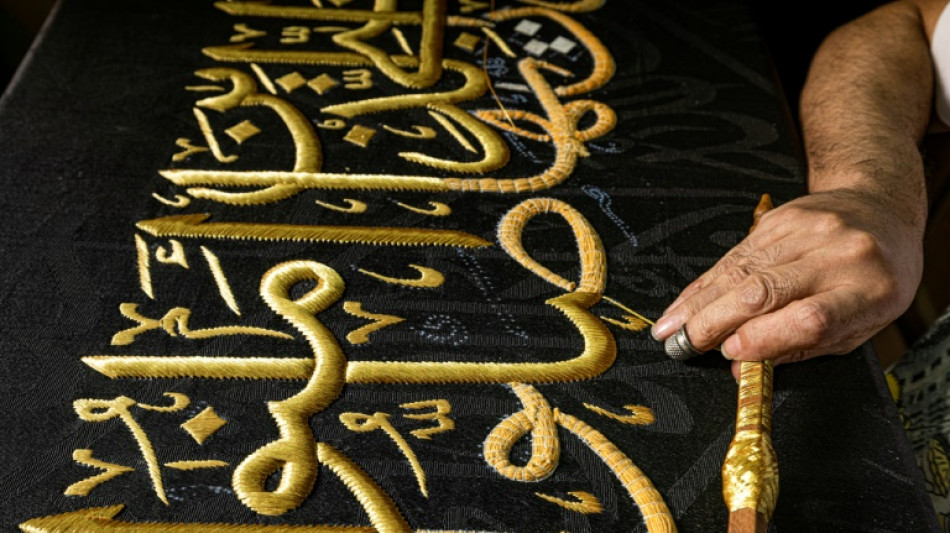
-
 Medieval tower collapse adds to Italy's workplace toll
Medieval tower collapse adds to Italy's workplace toll
-
BMW boosts profitability despite China, tariff woes

-
 South Africa's Wiese wary of 'hurt' France before re-match
South Africa's Wiese wary of 'hurt' France before re-match
-
Asian markets sink as tech bubble fears grow

-
 Beyond limits: Croatian freediver's breathtaking record
Beyond limits: Croatian freediver's breathtaking record
-
Tottenham supporting Udogie after alleged gun threat in London

-
 Thunder roll Clippers to stay unbeaten as SGA keeps streak alive
Thunder roll Clippers to stay unbeaten as SGA keeps streak alive
-
In appeal, Australian mushroom murderer alleges 'miscarriage of justice'

-
 Toyota hikes profit forecasts 'despite US tariffs'
Toyota hikes profit forecasts 'despite US tariffs'
-
Typhoon death toll soars past 90 in the Philippines

-
 Ex-France lock Willemse challenges Meafou to become 'the bully'
Ex-France lock Willemse challenges Meafou to become 'the bully'
-
Ukrainians to honour sporting dead by building country they 'died for': minister

-
 At least 7 dead after UPS cargo plane crashes near Louisville airport
At least 7 dead after UPS cargo plane crashes near Louisville airport
-
US Supreme Court hears challenge to Trump tariff powers

-
 US government shutdown becomes longest in history
US government shutdown becomes longest in history
-
India's Modi readies bellwether poll in poorest state

-
 Green goals versus growth needs: India's climate scorecard
Green goals versus growth needs: India's climate scorecard
-
Where things stand on China-US trade after Trump and Xi talk

-
 Sri Lanka targets big fish in anti-corruption push
Sri Lanka targets big fish in anti-corruption push
-
NY elects leftist mayor on big election night for Democrats

-
 Injured Jordie Barrett to miss rest of All Blacks tour
Injured Jordie Barrett to miss rest of All Blacks tour
-
Asian markets tumble as tech bubble fears grow

-
 Pay to protect: Brazil pitches new forest fund at COP30
Pay to protect: Brazil pitches new forest fund at COP30
-
Australia pick 'impressive' Weatherald in first Ashes Test squad

-
 Iraq's social media mercenaries dying for Russia
Iraq's social media mercenaries dying for Russia
-
Young leftist Trump foe elected New York mayor

-
 Concerns at ILO over expected appointment of close Trump advisor
Concerns at ILO over expected appointment of close Trump advisor
-
Venus Williams to return to Auckland Classic at the age of 45

-
 No deal yet on EU climate targets as COP30 looms
No deal yet on EU climate targets as COP30 looms
-
Typhoon death toll climbs to 66 in the Philippines

-
 NATO tests war preparedness on eastern flank facing Russia
NATO tests war preparedness on eastern flank facing Russia
-
Uncapped opener Weatherald in Australia squad for first Ashes Test

-
 Liverpool down Real Madrid in Champions League, Bayern edge PSG
Liverpool down Real Madrid in Champions League, Bayern edge PSG
-
Van Dijk tells Liverpool to keep calm and follow Arsenal's lead

-
 PSG left to sweat on injuries to Dembele and Hakimi
PSG left to sweat on injuries to Dembele and Hakimi
-
Reddit, Kick to be included in Australia's social media ban

-
 Ex-Zimbabwe cricket captain Williams treated for 'drug addiction'
Ex-Zimbabwe cricket captain Williams treated for 'drug addiction'
-
Padres ace Darvish to miss 2026 MLB season after surgery

-
 Diaz hero and villain as Bayern beat PSG in Champions League showdown
Diaz hero and villain as Bayern beat PSG in Champions League showdown
-
Liverpool master Real Madrid on Alexander-Arnold's return

-
 Van de Ven back in favour as stunning strike fuels Spurs rout
Van de Ven back in favour as stunning strike fuels Spurs rout
-
Juve held by Sporting Lisbon in stalling Champions League campaign

-
 New lawsuit alleges Spotify allows streaming fraud
New lawsuit alleges Spotify allows streaming fraud
-
Stocks mostly drop as tech rally fades

-
 LIV Golf switching to 72-hole format in 2026: official
LIV Golf switching to 72-hole format in 2026: official
-
'At home' Djokovic makes winning return in Athens

-
 Manchester City have become 'more beatable', says Dortmund's Gross
Manchester City have become 'more beatable', says Dortmund's Gross
-
Merino brace sends Arsenal past Slavia in Champions League

-
 Djokovic makes winning return in Athens
Djokovic makes winning return in Athens
-
Napoli and Eintracht Frankfurt in Champions League stalemate


Egypt family keeps alive tradition behind hajj centrepiece
Under the steady hum of a ceiling fan, Ahmed Othman weaves golden threads through black fabric, creating Koranic verses, a century after his grandfather's work adorned the Kaaba in Mecca's Grand Mosque.
A ceremonial hanging of the kiswa, huge pieces of black silk embroidered with gold patterns, over the cubic structure that is the centrepiece of the Grand Mosque symbolises the launch of the hajj annual pilgrimage, which starts this week.
Othman's family used to be honoured with the task of producing the kiswa.
His family's creations would be despatched in a camel caravan to Islam's holiest site in western Saudi Arabia towards which Muslims across the world turn to pray.
Now, Othman keeps the tradition alive in a small workshop, tucked above the labyrinthine Khan al-Khalili bazaar in central Cairo, where mass-produced souvenirs line the alleys.
The area is historically home to Egypt's traditional handicrafts, but artisans face growing challenges.
Materials, mostly imported, have become expensive, particularly as Egypt faces economic woes and a devalued currency.
Plummeting purchasing power makes high quality hand-crafted goods inaccessible to the average Egyptian, while master craftspeople find it hard to hand down their skills as young people turn to more lucrative jobs.
This wouldn't be the case "if there was good money in the craft", Othman sighed, hunched over one of the many tapestries that fill his workshop.
Sheets of black and brown felt are covered in verses and prayers, delicately embroidered in silver and gold.
Every stitch echoes the "sacred ritual" Othman's grandfather was entrusted with in 1924.
"For a whole year, 10 craftsmen" would work on the kiswa that covers the Kaaba which pilgrims circumambulate, using silver thread in a lengthy labour of love.
- Sprinkled rosewater -
From the 13th century, Egyptian artisans made the giant cloth in sections, which authorities transported to Mecca with great ceremony.
Celebrations would mark the processions through cities, flanked by guards and clergymen as Egyptians sprinkled rosewater from balconies above.
Othman's grandfather, Othman Abdelhamid, was the last to supervise a fully Egyptian-made kiswa in 1926.
From 1927, manufacturing began to move to Mecca in the nascent Kingdom of Saudi Arabia, which would fully take over production of the kiswa in 1962.
The family went on to embroider military regalia for Egyptian and foreign dignitaries, including former presidents Gamal Abdel Nasser and Anwar Sadat.
"In addition to our work with military rank embroideries, my father started embroidering Koranic verses on tapestries," and then reproducing whole sections of the kiswa.
Clients began flooding in for "exact replicas of the kiswa, down to the last detail".
Though today they offer small tableaus for as little as 100 Egyptian pounds (about $5), massive customised orders go for several thousand dollars, such as replicas of the Kaaba door, which Othman proudly claims are indistinguishable from the originals in Mecca.
- Back-breaking -
But the family has not been immune to the economic turbulence that began with the coronavirus pandemic, which decimated small businesses and craftsmanship in Egypt.
Since early 2020, they have sold around "two pieces per month", whereas before they would sell at least one tapestry a day.
Othman worries that a sense of "worldwide austerity" makes business unlikely to bounce back.
Today, there might only be a dozen or so craftsmen whose work he considers authentic, with many artisans leaving the craft for quicker cash flows.
"They can make 200 to 300 pounds a day," ($10-$16) driving a tuktuk motorised rickshaw, or a minibus, Othman said. "They're not going to sit on a loom breaking their backs all day."
But still, a century and a half after his great grandfather left his native Turkey and brought the craft with him to Egypt, Othman says he has stayed loyal to techniques learnt as a child when he would duck out of school to watch his father work.
"It's on us to uphold the craft the same way we learned it, so it's authentic to the legacy we inherited," he said.
G.AbuGhazaleh--SF-PST



